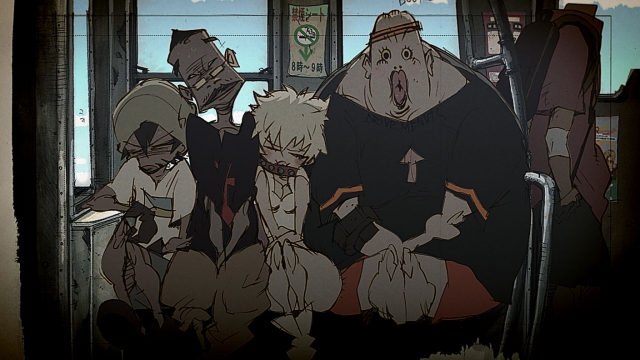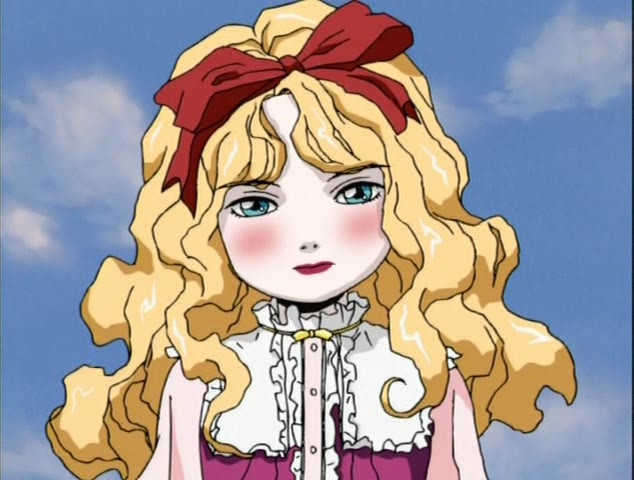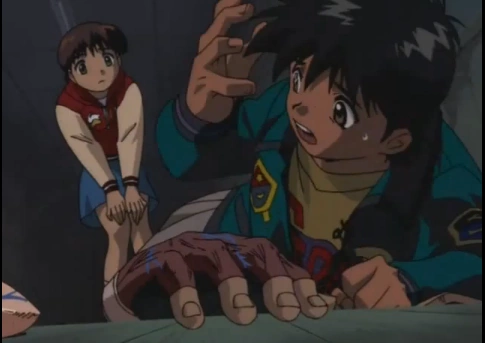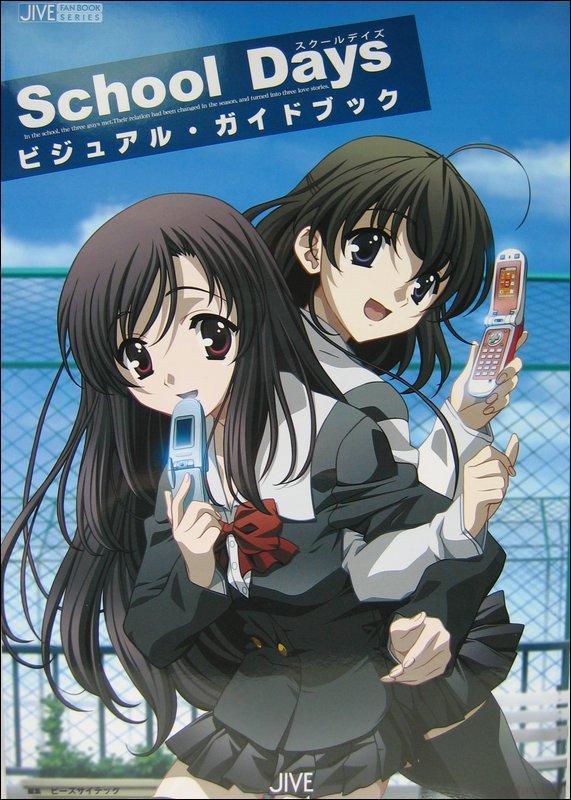 |
| From https://pics.filmaffinity.com/sukuru_deizu_ school_days_tv_series-259854327-large.jpg |
Director: Keitaro Motonaga
Screenplay: Makoto Uezu
Based on the adult
visual novel videogame by 0verflow
Voice Cast: Daisuke Hirakawa as Makoto Ito; Shiho
Kawaragi as Sekai Saionji; Tae Okajima as Kotonoha Katsura; Chiaki Takahashi as
Nanami Kanroji; Haruka Nagami as Otome Kato; Keiko Imoto as Setsuna Kiyoura; Megu
Ashiro as Kokoro Katsura; Ryouko Tanaka as Hikari Kuroda; Yoshiaki Matsumoto as
Taisuke Sawanaga
Viewed in Japanese
with English Subtitles
Synopsis: In high school, Makoto Ito is encouraged by his female
friend Sekai Saionji to start dating Kotonoha Katsura, a timid girl in another
class. Sekai however has feelings for him herself, and Makoto is not your usual
male anime protagonist when he starts getting bored with courting Kotonoha.
[FULL SPOILERS throughout; whilst a warning will be added to where
they are, this is an immediate warning you don't mind knowing the full details
of the plot.]
School Days is notorious for a good reason, though appearances for
this anime series can be deceptive. Its original based an adult visual novel
published in 2005. Visual novels are a popular medium especially in manga and
anime culture, interactive novels which are popular in Japan that have multiple
narrative paths and endings, and are entirely played by multiple choices (like a
choose-your-own adventure book) inter-spliced with animation or visuals.
"Adult" as, a sub genre in visual novels known as "eroge"
(erotic games), the original work was pornographic with explicit sex scenes
(barring Japanese censorship laws). The series was in lieu of a multimedia bonanza
after the original work did very well.
The surprising thing with School Days the animated adaptation is
that, with alarm bells ringing due to the series' erotic origins and its
initial tone in the first three episodes, it changes into a dark chimera
eventually of interest. Makoto Uezu
is a prominent screenwriter, and to my absolute surprise, director Keitaro Motonaga also helmed Malice@Doll (2000), a work that I hold
in high regard, though with the caveat that it's an odd creation as an early
computer animated body horror sci-fi work which is truly peculiar; I viewed
that one screenwriter (and premise creator) Chiaki
J. Konaka's work more, but it was nice to see Motonaga again, though barring co-directing the Rayearth OVAs with Toshiki Hirano in 1997, he's not got a lot in his career that
stands out and a bit of porn up until helming the recent Digimon Adventure tri. films, which create a large single work out
of six films between 2015-2018, which is definitely a BIG deal for him
alongside working in the background on a load of other prominent work.
The premise itself could've
easily descended in something bad on just the synopsis though, just a
de-eroticised melodrama if you never heard of the game. School Days, with its conventional (stereotypical) TV look of
bright colours and conventional characters designs are matched by a
stereotypically bland male protagonist and many close-ups of female characters'
figures, for more lurid and questionable in terms of a problematic male gaze
and weirder because these are characters still in school.
Kotonoha, the girl he is
initially pushed into dating by his tomboy female friend Sekai, is depicted as
a voluptuous big eyed girl who is quiet and shy around men, all whilst Sekai herself
spends her time arguing with him through exchanged notes in class. So for, it's
a stereotype of anime plotting that also is part of the "harem" sub-genre.
Harem, originally a term from ancient Muslim culture of a separate part of a
household for wives, concubines, and female servants, as well as eventually
turning into a completely sexual term for a group of women with one male lover,
is its own anime/manga sub-genre which usually denotes one male surrounded by
multiple female suitors; there is the "reverse harem", one woman and
multiple male suitors, and LGBT variations, but harem stories that are the most
famous (and divisive) include the Love
Hina franchise where its one male, and many potential female suitors.
Whatever one's opinion on the subject - whether polygamy (or polyandry) are
morally acceptable or even practical, whether harem stories can be great or
fall (especially with those with multiple female suitors) into crass or just
badly written stories - School Days thankfully
changes its tune soon into itself when the tale it sets up immediately goes sour.
[MAJOR Spoiler Warnings here]
And by sour, as in our male
protagonist, eventually turning out to be a chronic womanizer with an ease in
cheating on multiple girls, is murdered by one character, whilst another is disembowel.
The diagram for the beginning to the ending, from the initial romance with
light comedy at the beginning to where his head is severed and kept as a
possession for a heartbroken suitor, is as jarring a tonal shift without a lot
of context to how this happened.
[MAJOR Spoilers End]
Notoriously, and where the
fascinating reward in School Days is
found, even if it feels like being in a meat grinder for all twelve of its
episodes, the original visual novel when it came to the "bad endings"
got violent. Visual novels, due to their nature, have "good endings"
and "bad endings" like some videogames, where the choices made in
options will dictate where the story will progress. So an inspired decision was clearly made to
make a show based on the worst type of ending whilst, on purpose or with
unintentionally greater weight, to turn this property into an anti-harem story.
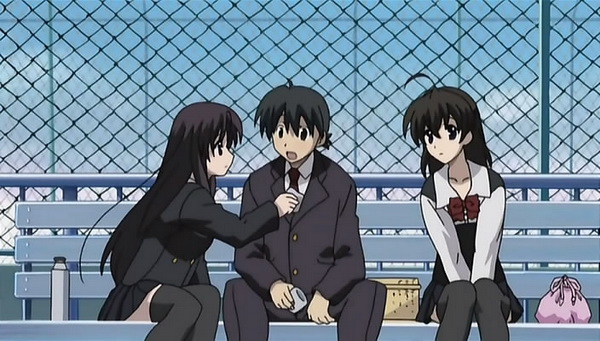 |
| From https://canime.files.wordpress.com/2010/01/school-days702.jpg |
Mainly because it shows the worst in its cast, as our male lead Makoto, as mentioned, is a womanzier, his friend Sekai, despite pushing him to another girl, has a crush on him, and the school (especially the girls) is full of bullies and individuals who think by their hormones or are cruel. The only innocent characters are Kotonoha, the initial romantic interest, and arguably a female character named Otome, who likes Makoto and has sex with him even when he's dating others, but is fleshed out as being more complicated in this dicey predicament, as is Setsuna, Sekai's own diminutive female friend also revealed to have a crush on him, and does some problematic things, but has the issue that about to leave for France, as a plot thread reveals, she's concerned for her friend Sekai's well being when she is no longer there. No one else, however, is above whale manure in some of the things they do; even Sekai, whilst the conflicted main female character with Kotonoha, is willingly dragged into a romance that is a disaster from the get-go. Even Makoto's horn dog but wholesome male friend Taisuke eventually does something in a later episode which is horrifying.
The worst thing, and why for how
ridiculous and way too cruel the story goes School Days actually succeeds, is that it's not morally black and
white, but with everyone including Makoto himself being confused hormone driven
teenagers. It's definitely gotten a reaction for viewers who expected clichés;
the comments section of Crunchyroll
added to my viewing experience, a curious tale in itself of viewers wanting to
kill Makoto, slap everyone else and vile anguish whilst those in the know, who
say the series already, teased the horrifying climax of it all. I myself was
aware of the ending, that Makoto would eventually be shown as a womanzier, and that
the comeuppance was a nasty one, but not only did I not know the full extent of
said ending, but my knowledge didn't ruin the show but arguably improved it.
Especially as it soothed over the awkward first three episodes, knowing where
it went brought a sense of tragic finality to the proceedings. It added to the
idea that a character like Makoto is not explicitly evil, even when near the
end of the series has a foursome with three female classmates when he's already
sleeping around and betraying multiple girlfriends, but something worse in his
banality. Far more disturbing, even if exaggerated, is that he's just an
apathetic and dumb young man who thinks with his smaller head, and has little
wisdom of emotions, more honest as a moral ground for the series to take as a
result even if it's more agonising for a viewer to experience.
And whilst their all stereotypes,
that helps because of this attitude; Sekai, complicating things as she still
helps him to date Kotonoha, has a strange relationship including practice
foreplay sessions which are just as problematic as they should be to a viewer,
naturally leading to complications. Setsuna, Sekai's friend, has a crush on
Makoto too, as does Otome, all whilst their female peers can be vindictive and
backstabbing, all feeling less like sexist depictions but like many teenagers
misguided behaviour. It's an attempt at least at complexity in spite of itself,
even a character like Kotonoha in that her hesitance in a physical relationship,
pushing Makoto away, is due to having been teased for her figure at a young age
alongside a sense, taking up knitting and devoted to her younger sister, that
the character's meant for a viewer's perspective to have been a meek figure,
the shy girl you cheer when she does muster a bravery to be bolder in her
romance only for Makoto to be an oblivious cheater who dithers. Add to this
that her female peers in her class bully her, a mean streak made worse when
they will even film other female students secretly in a "break room"
at the school festival to humiliate them publically, and Kotonoha's turn in the
end to madness, glazed look looking at her phone on the street, is the real
tragedy of it all.
The effect of this tragedy, the
ending itself, gained School Days
its notoriety as, tragically, it had the poor timing for the final episode to
be about to be aired just when a real life murder took place. On September 18th
2007, a sixteen year old murdered her father, a 45-year-old police sergeant in
the traffic division at Minami Police Station in Kyoto Prefecture, with an axe.
Another series, part of the Higurashi:
When They Cry franchise, was
also affected by this in terms of its screening on television, but how TV Kanagawa dealt with School Days transferred from a
legitimate tragedy, in terms of any murder ever taking place and the gristly
nature of this particular one, to an accidental internet meme. Instead of the
episode, they showed half an hour of scenery, including a lake with a Norwegian
ferry on it, showed with Air on a G String
playing over the images. "Nice Boat", as the meme came to be, came
from a 4chan user commenting on the
replacement material, and it became popular in Japan; whilst the creators of
the game 0verflow arranged two
screenings of the edited finale at the Akihabara
3D Theater on September 27, the meme even found its way into the Melancholy of Suzumiya Haruhi-chan, a straight-to-net spin-off of The Melancholy of Haruhi Suzumiya franchise,
when the Kadokawa Pictures's YouTube channel uploaded a short
montage of sailboats instead of the previously scheduled premiere of that ONA.
Even without this real life
censorship which overrode its infamy, even the edited version doesn't detract the
results; built up to over painful eleven episodes of miscommunication, cheating
and broken emotions, the ending no matter how over-the-top it ends up, actually
ending up on a sailboat in some perverse irony in the final shot, does have a
weight to it from the tragic circumstances that lead to it. In fact, the idea
that it's both an antidote to the problematic show trope of the harem anime as
well as another example proves an advantage. The look of the show helps with
this, the stereotypical character designs with big eyes emphasising the darker
moments in vast contrast, and the leering fan service thankfully gives way to frankness
about sex even in the dialogue. The series does, to lighten the tone and offer
levity between the cesspool, have humour, reaching its crescendo (before
departing) at the school festival, where the mascots of the classes jostle for
crowds; once it goes, so does the series manage to get even darker than before
when the gloves come off completely.
In fact, the entire aesthetic is perfect
- "School Days" a perfect title that sounds innocuous, but develops a
weight when it's the last episode title. The light pop songs used, even the
fact the end credits are centred on a mobile phone, an object which plays such
an important part in the drama as a catalyst for drama (such as blocking
someone off one or secretly conversing to others with) is absolutely
appropriate. The result, aware of how it bruised and batted me around through
the twelve episodes, was unique, like a necessary poison and incredible idiosyncratic
in lieu of what was purposeful or accidental creativity. So much so that it's
accidental notoriety, whilst important for the series to be known in the West,
only released in the West by Discotek
for US DVD release in 2014, seems like the least interest detail.
| From http://behind-the.nihonreview.com/wordpress /wp-content/uploads/2007/09/kiyoura3_th.jpg |




